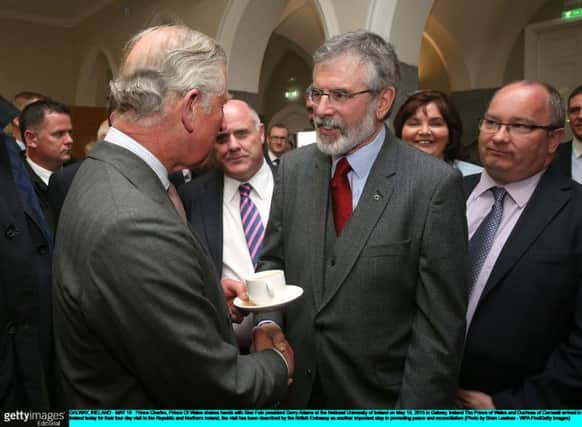Leaders: Negative inflation | A historic meeting


A historic moment in the Consumer Price Index calculation has occurred, with the rate of inflation falling to -0.1 per cent. It is the first time this has happened since March 1960, which is why economists spent much of yesterday trying to explain that this phenomenon could logically be defined as deflation, but in all likelihood is not quite that.
The term deflation should, the argument goes, refer to a longer trend than one moment in time, when an extended effect becomes damaging because consumer spending falls when confidence is undermined. And according to the same experts, this month’s rate is unlikely to be sustained. In other words, it is a blip.
Advertisement
Hide AdAdvertisement
Hide AdChancellor George Osborne has hailed the latest figures as “good news for family budgets”. He stopped short of crediting Conservative policies with creating this domestic windfall, and wisely so. Economists put the “negative inflation” effect down to factors such as the spur of falling oil prices, and a drop in air and sea fares caused by the timing of Easter this year. These are not economic levers within the UK government’s reach.
What we are experiencing with negative inflation might appear to be uncharted territory but it is not expected to be significant. Independent economists were in agreement in estimating that inflation should return to the 2 per cent mark in two to three years’ time. It should also be noted that “core” inflation – which strips out the more volatile prices such as energy and food – has not entered the negative: this measure was at 0.8 per cent last month.
Behind his upbeat public response, Mr Osborne must be concerned. The pre-election line from his party was that economic recovery was under way, and safe in his party’s hands. But his stated aim is for inflation of 2 per cent, and the reality has been a rate below that target for some time. Economic growth in the UK remains fragile, and is susceptible to factors such as a slowdown elsewhere, and uncertainty over the promised EU referendum. No-one should get carried away with a sense that austerity is all behind us. We are not out of the woods yet.
Meantime, deflation-that-isn’t-deflation can still be of benefit, provided it doesn’t overstay its welcome. Andrew Sentance, senior economic adviser at PricewaterhouseCoopers and a former member of the Bank of England’s Monetary Policy Committee, states that “flat or slightly falling consumer prices are good for growth, boosting consumer spending power. So a temporary period of slightly negative inflation can be good for the UK economy.”
Consumers should treat this as a bonus, and enjoy it while we can. But we can’t afford it to last.
Welcome development in peace process
PEACE and reconciliation are in the air as Prince Charles fulfils engagements on a four day-tour of Ireland, where a symbolic meeting with Sinn Fein leader Gerry Adams took place yesterday.
Charles’s life has been choreographed and scripted from the moment he learned to walk and talk, but he retains that basic human instinct: emotion.
Today he will visit Mullaghmore, which will hold painful memories. In 1979, the Prince’s great-uncle Lord Mountbatten was killed in the village harbour by an IRA bomb. After this devastating loss, it was a further 16 years before the heir to the British throne would make his first official visit to Ireland as the Troubles started to subside.
Advertisement
Hide AdAdvertisement
Hide AdFor Mr Adams, the visit also marks a milestone in Anglo-Irish relations. Here is a Republican who rejects all that the British establishment stands for, shaking hands with a member of the Royal Family and talking about engagement, healing, understanding and moving towards the future. Charles, for his part, praised Ireland’s “unique magic” and spoke of the country being owed “an enormous debt of gratitude” for raising the spirits of so many people.
We have no reason to doubt the sincerity of either party. The peace process does appear to be making progress. But we should not forget that the threat of violence has not disappeared entirely. Last week, six arrests were made after police discovered bomb-making equipment close to a location Charles is to visit.
Yesterday’s meeting is another step on the journey of achieving lasting peace where differences had looked irreconcilable. There remains some distance to travel, but by Prince Charles and Gerry Adams giving open support to this process, it stands a greater chance of success.